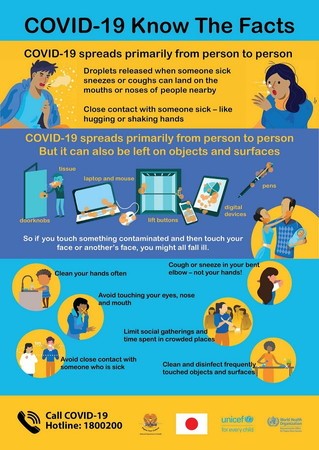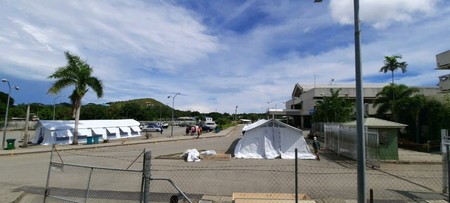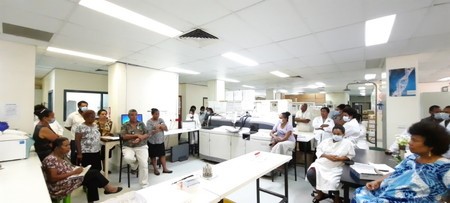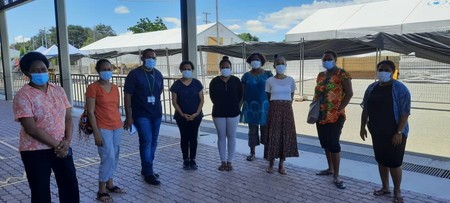【20-39】パプアニューギニアの新型コロナウイルス
2020年7月01日 Joe Norrie(University of Papua New Guinea、さくらサイエンスプラン(SSP)同窓生)
科学技術振興機構(JST)中国総合研究・さくらサイエンスセンター(CRSC)では、2014年度より日本・アジア青少年サイエンス交流事業「さくらサイエンスプラン(SSP)」を実施し、科学技術交流を通じてわが国とアジアを中心とした各国・地域との連携・協力関係を深めてまいりました。各種報道の通り、現在、世界中で新型コロナウイルス感染症の流行が拡大しておりますが、本コーナーでは「さくらサイエンスプラン」に参加している各国・地域の関係機関・関係者より現地の新型コロナウイルス感染症について、その状況や対策等をリポートします。
2020年6月2日現在、パプアニューギニアでの新型コロナウイルスの総症例数は8人で死亡例はまだありません。6人は軽症で完治、残りの2人は中等症で入院して回復し、そのうち1人は本国へと送還されました。当初、パプアニューギニア医学研究所では、PCRを用いて検査が行われていましたが、事務的・技術的な問題があったため、政府が介入し、オーストラリアに検体を送って検査する方法に移行しました。WHOとオーストラリア政府は、Gene Xpertと呼ばれる新型コロナウイルスの検査キットをパプアニューギニアに提供し、国内の検査能力向上に著しく寄与しました。Gene Xpertは、国内でも既に結核の検査に使用されているため、新型コロナウイルスの検査には最適な検査方法でした。5月30日の時点で、人口890万人に対し、実施検査数は4,646件になります。
パプアニューギニアで最初に確認された新型コロナウイルスは、国外からの流入例で、3月19日に診断され、翌日3月20日には首相から正式な発表が出されました。その後、3月23日に患者は母国(オーストラリア)へと移送されました。しかし、3月22日には、首相が非常事態宣言を発令し、14日間の移動制限を講じました。4月6日には2例目が報告され、その後、4月16日には更に5つの陽性例が報告されました。非常事態宣言も5月初旬まで、さらに4週間延長されました。
パプアニューギニアの最新症例(8例目)は東部山岳州に住む45歳の女性で、現在、アサロで隔離され、アサロ地区病院は封鎖されました。彼女はラエからの旅行の帰りに、兄の家に泊まった後、体調を崩したと報告されています。彼女の兄は後に、新型コロナウイルスの検査のためサンプル採取されましたが、陰性であることが判明しました。
感染の拡大を抑えるために、パプアニューギニアでは濃厚接触者の追跡が積極的に行われています。濃厚接触者には、仕事仲間、親戚、家族、近隣住民などが含まれています。仕事仲間には、ナショナル・オペレーション・センター(NOC)のスタッフも含まれていました。国は濃厚接触者に対して、予防措置として自己隔離を求めています。
海外への渡航制限もまだ続いており、現時点では、政府は非常事態宣言をさらに2ヶ月間延長する計画を立てています。我々は国境での監視を強化し、22州すべてで新型コロナウイルスの検査を行っています。
このパンデミックから学ぶべきことはたくさんあります。国家的な側面から見ると、ジェームズ・マラペ首相の強力なリーダーシップの下、政府は迅速に対応し、国をまたぐ旅行を制限し、国境警備を強化すると同時に、国境の監視体制を改善しました。しかし、それと同時に今回のパンデミックは、国の医療システムの脆弱性を露呈させました。
これらの事態に対し、私たちは十分な事前準備を実施することもできず、緊急事態に対応するための人手やインフラも欠けていました。890万の人口規模に対して、検査能力も不足していたため、パプアニューギニアがパンデミックに陥った場合、陽性患者に対応するための人手も充分ではなく、医療崩壊につながっていたことでしょう。最初の陽性患者が発覚した際には、国内には人工呼吸器が15台(60万人に1台)しか用意されていませんでした。
とても残念なことに、この状況から金儲けの機会を窺う人々も多くいました(特に政府への資金提供者が増えたため)。
私の考えとして、このパンデミックによって明らかになった、我が国が現在必要としていることは:
I. 腐敗した政府関係者を排除すること
II. 医療改革
III. 政府管理の改善と透明性の向上、資金管理など
IV. 厳しい国境制限
V. 保健所の増員(医師や看護師の増員)
VI. 警備隊の増員(軍隊、警察)
VII. パンデミック関連のトレーニングを受けた専門家の雇用と育成
VIII. より多くの研究室と研究者
IX. 感染拡大時の管理と監視、それらに関わる条例
X. ウイルスのモニタリングに適したデータベース
私は病理検査室の医師として、国立病院での新型コロナウイルスの対応に直接関わっていました。私の通常業務は病院の研究室から依頼される外来患者への対応のため、影響を受けました。私は法医学病理部門の対応計画を作成し、同時に病院の(新型コロナウイルスの)国家監視チームにボランティアとして参加しました。妻は救急医であり、病院での新型コロナウイルスの緊急対応を担当していました。私たちはそれぞれの部署で準備に追われていました。病院では予防措置として、緊急事態宣言期間中は全ての外来患者の来院を制限していますが、一番心配したのは、新型コロナウイルスによって患者さんが来院拒否されることでした。今これらの状況を振り返ってみると、もっと良い対応ができたのではないかと思います。
3月の緊急事態の間は、全ての教育機関も閉鎖されました。私には小学4年生の娘がいます。彼女はロックダウンの間、オンラインでの教育を受けていました。
ロックダウン中は街がきれいな状態で保たれました。制限が解除されるにつれて、人々の行動にも変化が見られました。彼らはより環境保全を意識するようになり、また手の衛生習慣をより意識するようになりました。

パプアニューギニアの国家衛生部門とWHOが作成した新型コロナウイルスの予防に関するポスター(英語版)。UNICEFと日本政府のサポートで製作

ポートモレスビー総合病院、救急部トリアージ前のスクリーニングテント(右)と隔離テント(左端)。

ポートモレスビー総合病院検査室(新型コロナウイルスに関する説明会)

ポートモレスビー総合病院管理チームのメンバーが新型コロナウイルス対応病院とスクリーニングセンターを視察
※本稿はさくらサイエンスプラン同窓生からの寄稿文を中国総合研究・さくらサイエンスセンターが日本語訳したものである。
●英文オリジナル
Covid-19 in Papua New Guinea
Joe Norrie,
University of Papua New Guinea
As of 2nd June 2020 the total case of Covid-19 in Papua New Guinea is 8 persons with no death. Six cases were mild and have fully recovered; two were moderate cases, admitted to hospital and recovered, one of which was repatriated. Initially, samples were tested locally using PCR at the Papua New Guinea Medical Research Laboratory, however, due to the administrative and technical issues faced, the government intervened and had samples sent to Australia for testing. The WHO and the Australian government have helped with the testing capabilities in the country by supplying Gene-Xpert Cartridges for COVD-19 testing. It was the best option for testing because we already use Gene Xpert machines available for Tuberculosis testing throughout the country. The number of tests performed as of May 30th is 4646, which is out of a population of 8.9 million.
The first confirmed COVID-19 case in PNG was an imported one, found on March 19, 2020, and was officially announced by the Prime Minister the following day. The patient was then transferred to the home country (Australia) on March 23, 2020. However, on March 22, 2020, the Prime Minister declared a state of emergency and limits movement of people for a period of 14 days. The second case was reported on April 6, which was then followed by 5 confirmed cases reported on April 16, 2020. The state of emergency was extended for another 4 week until the beginning of May.
The latest case (Patient no.8) of PNG's cases is from Eastern Highlands Province. This 45 year-old woman confirmed with COVID-19 is now isolated in Asaro. The Asaro District Hospital was locked down. She was reported to have got sick after travelling back from Lae, after staying with her brother. This brother has been identified and his sample was collected for testing, which turned out to be negative.
Contact tracing was aggressively carried out in in PNG to control the spread of the disease. The contact people includes workmates, relatives, close family members and neighbours. The workmates include the National Operation Center (NOC) staff. Contacts have also been asked to self-quarantine as a preventive measure.
There are still international travel restrictions and as of today the government is planning to extend the state of emergency for 2 months. We have improved surveillance at our boarders and testing in all 22 provinces.
There is so much to learn from the current pandemic. From the national viewpoint, the government under the leadership of Prime Minister James Marape acted promptly to shut down international travel and tighten boarder security and improve boarder surveillance. The pandemic exposed the vulnerabilities of the national health system.
In hindsight, it is fair to state that we were never prepared nor did we have the manpower or infrastructure to deal with what was coming. We lacked testing capabilities relative to the population size and if the pandemic took a turn for the worst in PNG, we would definitely have a shortage of manpower in the frontline to deal with sick patients. In addition to a shortage of manpower, the country had only 15 ventilators (i.e. 1 per 6 00 000 population) when our first case was detected.
Unfortunately, there were also a lot of people who saw an opportunity to make money from the situation (especially with increased donor funding being given to the government).
In my opinion, this pandemic has showed PNG that it needs,
I. To get rid of corrupt government officials
II. A health reform
III. Good Governance, transparency and management of funds
IV. Strict boarder control
V. More health training centers (more doctors, more nurses, etc)
VI. More security personnel (army, police)
VII. Pandemic trained specialist
VIII. More research laboratories and scientists
IX. A National protocol for outbreak management and surveillance
X. Good database for disease monitoring
Being a doctor in the pathology lab, I was directly involved with the covid-19 response in the national referral hospital. My normal duties were affected in terms of the outpatient services provided by the lab. I organized the response plan for forensic pathology department while also volunteering with the national surveillance team at the hospital. My wife, being an emergency physician was responsible for the covid-19 emergency response at the hospital. We were both very busy with preparation in our respective departments. The hospital stopped accepting all outpatient referrals during the state of emergency lockdown period as a precautionary measure. My biggest concern at that time was the rejection of patients during the covid-19 hype. Looking back I think we could have planned our response better.
All schools were shut during the state of emergency in March. I have a daughter who is in grade 4. She received and did her activities online during the lockdown.
During the shutdown period the city was much cleaner. As restrictions were being lifted I could see a change in people's attitude. They had become more conscious about the environment with regards to distancing and also people had become more aware of personal and hand hygiene practices.